A Glimpse Of Vietnam (06 Days)
Hanoi | Halong | Hue | Hoi An | Danang | Saigon
Day 01 : Hanoi - Halong
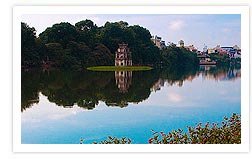
By
vehicle from Hanoi to Halong Bay. Journey east along Highway 5 across Hai
Hung Province and around Halong Bay. Boat trip Halong Bay (4 hours)
Cruise on a traditional wooden boat among the emerald waters and craggy
limestone cliffs of Halong Bay, stopping at different islands to explore
some of the many caves in this area. Sail past floating villages, fishermen
casting their nets and pearl fisheries and observe the rhythms of daily life
on the bays. Overnight in Halong Bay.
Day 02 : Halong - Hanoi
By vehicle from Halong to Hanoi. Journey around Halong Bay to Hai Phong and
west along Highway 5, across Hai Hung Province.
Sightseeing in Hanoi.
Hanoi, a city of lakes, shaded boulevards and public parks, is the capital
of Vietnam. It is a very attractive city with French style buildings and
less traffic than other cities in Asia.
Museum Of Ethnology : This museum brings to life the astonishing ethnic
diversity in Vietnam, with art and artifacts from the 54 different ethnic
groups that inhabit the country. Inside the museum are detailed descriptions
of minority groups, with examples of their traditional clothing and way of
life. Outside are faithful reconstructions of traditional longhouses,
cemeteries and other distinctive ethnic buildings.
Old Quarter : Discover the old quarter of Hanoi. This fascinating area of
narrow alleys and shop-houses is also called "36 streets," most of
which are named after the crafts or merchandise traditionally sold there.
Hoan Kiem Lake : right in the heart of Hanoi, this lake contains an islet
with the tiny Tortoise Pagoda, topped with a red star and the Ngoc Son
Pagoda on its northern shores.
Overnight in Hanoi. (B/B)
Day 03 : Hanoi - Hue
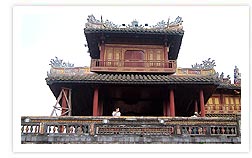
Flight
from Hanoi to Hue.
Sightseeing Old Imperial City
Imperial City : located in the Citadel, it was built in the early 19th
century and modeled after the Forbidden City in Peking. There are numerous
palaces and temples within these walls, as well a library and a museum.
Ngo Mon Gate : the principal entrance to the Imperial Enclosure. The
central passageway with its yellow doors was reserved for use by the
emperor, as was the bridge across the lotus pond.
Thai Hoa Palace : built in 1803 and moved to its present site in 1833, Thai
Hoa Palace is a spacious hall with an ornate roof of huge timbers supported
by 80 carved and lacquered columns.
Halls Of The Mandarins : these buildings, in which the mandarins prepared
for court ceremonies held in the Can Chanh Reception Hall, were restored in
1977.
Nine Dynastic Urns : these were cast in 1835-36. Traditional ornamentation
was then chiseled into the sides of the urns, each dedicated to a different
Nguyen sovereign.
Forbidden Purple City : this was reserved for the personal use of the
emperor.
Visit Imperial Tomb of Emperor Tu Duc
Tu Duc Tomb : Emperor Tu Duc, who ruled Hue more than 100 years ago, built
his tomb when he was still alive and used it for meditation, reading and
theater performances. There are pavilions in a tranquil setting of forested
hills and lakes. The tomb was constructed between 1864 and 1867. Tu Duc, who
was the longest reigning Emperor, lived a luxurious life.
Visit Dong Ba Market
Dong Ba Market : a local market near the Imperial City
Overnight in Hue. (B/B)
Day 04 : Hue - Hoi An
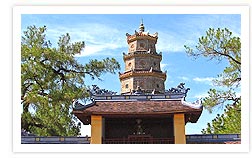
Excursion
on Huong Giang River to the Thien Mu Pagoda with boat trip
Thien Mu Pagoda : just outside of Hue, on the bank of the Perfume River,
this was a hotbed of anti-government protest during the early 1960s. Behind
the main sanctuary of the pagoda is the Austin motorcar which transported
the monk Thich Quang Duc to the site of his 1963 self-immolation By vehicle
from Hue to Hoi An with sightseeing in Danang
Danang : Vietnam's fourth largest city marks the northern limits of
Vietnam's tropical zone, boasting a pleasant year-round climate.
Cham Museum : founded in 1915 by the Ecole Francaise d'Extreme Orient, the
open-air collection of Cham sculpture is the finest in the world. Many of
the sandstone carvings are breathtaking.
Marble Mountains : Five stone hillocks, once islands, made of marble. Each
is said to represent one of the five elements of the universe. The largest
and most famous, Thuy Son, has a number of natural caves in which Buddhist
sanctuaries have been built over the centuries. When the Champas ruled this
area, these same caves were used as Hindu shrines.
Overnight in Hoi An. (B/B)
Day 05 : Hoi An - Danang - Saigon
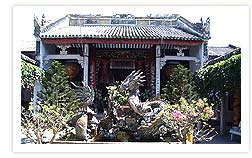
Sightseeing
Hoi An
Hoi An is a picturesque riverside town south of Danang. Known as Faifo to
early western traders, it was one of South East Asia's major international
ports during the 17th, 18th and 19th centuries.
Quan Cong Temple : founded in 1653, this Chinese temple is dedicated to
Quan Cong, whose partially gilded statue is in the central altar at the back
of the sanctuary.
Phuoc Kien Pagoda : Chinese pagoda built around 1690 and then restored and
enlarged in 1900. It is typical of the Chinese 'clans' that were established
in the Hoi An area. The temple is dedicated to Thien Hau Thanh Mau (Goddess
of the Sea and Protector of Sailors and Fishermen).
Japanese Covered Bridge : the first bridge on this site was constructed in
1593 by the Japanese community of Hoi An to link the town with the Chinese
quarters across the stream.
Tran Family Chapel : this house for worshipping ancestors was built about
200 years ago with donations from family members. The Tran family traces its
origins to China and moved to Vietnam around 1700. The architecture of the
building reflects the influence of Chinese and Japanese styles.
Sa Huynh Museum : located near the Japanese Covered Bridge, it contains
exhibitions from the earliest period of Hoi An's history.
Phung Hung House : the same family has been living here for eight
generations. The house is a combination of Vietnamese, Japanese and Chinese
styles.
Quang Dong Pagoda : this pagoda was open to all Chinese traders or seamen
and is dedicated to Thien Hau - it's a small Chinese style temple with a
lintel gate and lucky animals depicted in statuary. Flight from Danang to
Saigon.
Overnight in Saigon. (B/B)
Day 06 : Saigon
Sightseeing in Saigon and Cholon (Chinatown)
Saigon is the largest of Vietnamese cities, with the hustle and bustle of
Vietnamese life visible everywhere. There are street markets, sidewalk cafes
and sleek new bars. Yet within this teeming metropolis are 300 years of
timeless traditions and the beauty of an ancient culture.
Notre Dame : built between 1877 and 1883, it is set in the heart of
Saigon's government quarter. It has a neo-Romanesque form and two high
square towers. In front of the cathedral is a statue of the Virgin Mary.
Central Post Office : The structure was built between 1886 and 1891 and is
by far the largest post office in Vietnam.
City Hall : completed in 1908, also known as "Hotel de Ville",
and located at the northern end of Nguyen Hue Boulevard. With its ornate
gingerbread facade it looks like the town hall of a French town.
War Remnants Museum : collections of weapons and photographs from two
Indochina wars are exhibited along with the original French 'Guillotine'
brought here in the early 20th century.
Ben Thanh Market : the central market of Saigon, its surrounding streets
make up one of the city's liveliest areas. Everything commonly eaten, worn
or used by the average resident of Saigon is available here.
Thien Hau Pagoda : built by the Cantonese congregation in the early 19th
century. The pagoda is one of the most active in Cholon and is dedicated to
Thien Hau. Transfer to the airport. (B/B)
B/B - Breakfast
End of Service
Package Includes :
- English-speaking guide.
- 05 nights accommodation
- Where very early morning flights are scheduled, a breakfast box may
replace the standard ABF.
- Meals according to itinerary.
- Flight from Hanoi to Hue / Danang to Saigon.
- Boat ticket(s) according to the itinerary.
- Ground transportation in private A/C vehicle (complimentary cold towels
and drinking water).
- Sightseeing incl. admission fees according to itinerary
Package Exclusions :
- All flights & airport taxes
- All entrance fees to monuments, camera fees, porterage and tips, mineral
water, laundry, telephone or any other expense personal in nature.
- Visa fees
- Personal Insurance
- Drinks and lunches/dinner except where mentioned
- Items of a personal nature
- Driver and guide gratuities
- All entrance fees and excursions not mentioned above
- Porterage at hotels and airports
- Any expenses caused by reasons beyond our control such as bad weather,
natural calamities (landslides, floods), flight delays, excess baggage,
rescheduling or cancellations, any accidents, medical evacuations, riots,
strikes, war, airline or hotel policies etc.
** Accommodation is subject to
availability. If the listed accommodation is fully booked, alternate
accommodation will be offered. All hotel ratings are according to the local
accreditation authority.

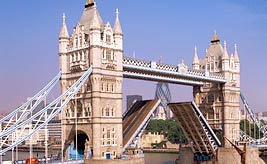
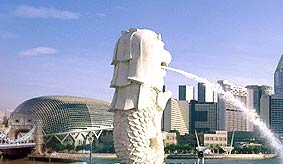
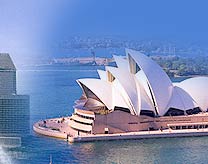


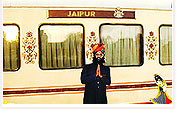
 By
vehicle from Hanoi to Halong Bay. Journey east along Highway 5 across Hai
Hung Province and around Halong Bay. Boat trip Halong Bay (4 hours)
By
vehicle from Hanoi to Halong Bay. Journey east along Highway 5 across Hai
Hung Province and around Halong Bay. Boat trip Halong Bay (4 hours) Flight
from Hanoi to Hue.
Flight
from Hanoi to Hue. Excursion
on Huong Giang River to the Thien Mu Pagoda with boat trip
Excursion
on Huong Giang River to the Thien Mu Pagoda with boat trip Sightseeing
Hoi An
Sightseeing
Hoi An